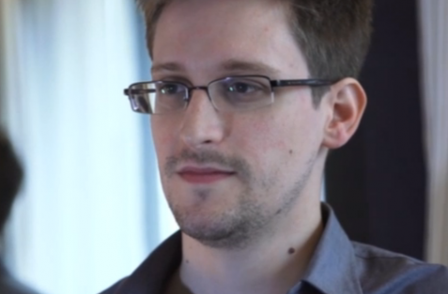
Guardian editor Alan Rusbridger revealed today that the paper agreed to the destruction of computer hard drives containing information from NSA whistleblower Edward Snowden following pressure from the UK authorities.
But he said the act was largely symbolic because The Guardian will continue to report on the information from overseas.
The revelation comes after the partner of Guardian writer Glenn Greenwald was detained and questioned for nine hours at Heathrow airport on Sunday.
David Miranda was ferrying materials between Brazil, where he lives with Greenwald, and documentary-maker Laura Poitras in Berlin.
He told The Guardian: "They were threatening me all the time and saying I would be put in jail if I didn't co-operate."
He has said that he revealed his computer passwords to police and that they confiscated a computer and other electronic items from him.
Snowden first contacted Poitras in December last year via a complex system of computer encryption. She brought Greenwald in and since then the pair have mainly worked with The Guardian on publishing revelations about US and UK government surveillance.
They claim to be the only people in posession of all the documents Snowden released.
Today Guardian editor Rusbridger revealed that he has been under pressure for months to hand over or destroy the leaked Snowden material.
He wrote: "Greenwald's work has undoubtedly been troublesome and embarrassing for western governments. But, as the debate in America and Europe has shown, there is considerable public interest in what his stories have revealed about the right balance between security, civil liberties, freedom of speech and privacy.
"He has raised acutely disturbing questions about the oversight of intelligence; about the use of closed courts; about the cosy and secret relationship between government and vast corporations; and about the extent to which millions of citizens now routinely have their communications intercepted, collected, analysed and stored."
He said that because no electronic means of communication can be seen as safe for journalists, the Snowden story has involved a huge amount of flights and face-to-face meetings.
He said: "The detention of Miranda has rightly caused international dismay because it feeds into a perception that the US and UK governments – while claiming to welcome the debate around state surveillance started by Snowden – are also intent on stemming the tide of leaks and on pursuing the whistleblower with a vengeance. That perception is right. "
Rusbridger said that just over two months ago he was contacted by a "very senior government official" claiming to represent the views of Prime Minister David Cameron. There were then two meetings, Rusbridger says, at which he was urged to return or destroy all the Snowden material.
Rusbridger said that "the mood toughened" just over a month ago with a call "from the centre of government" saying: "You've had your fun. Now we want the stuff back."
After being told that the Government was prepared to go down the legal route to secure the documents, Rusbridger says the Guardian complied with the request and that two experts from GCHQ oversaw the destruction of the relevant hard drives.
Rusbridger wrote: "Whitehall was satisfied, but it felt like a peculiarly pointless piece of symbolism that understood nothing about the digital age. We will continue to do patient, painstaking reporting on the Snowden documents, we just won't do it in London. The seizure of Miranda's laptop, phones, hard drives and camera will similarly have no effect on Greenwald's work."
Warning that the targeting of The Guardian represents a threat to all journalists, Rusbridger said: "The state that is building such a formidable apparatus of surveillance will do its best to prevent journalists from reporting on it. Most journalists can see that. But I wonder how many have truly understood the absolute threat to journalism implicit in the idea of total surveillance, when or if it comes – and, increasingly, it looks like 'when'.
"We are not there yet, but it may not be long before it will be impossible for journalists to have confidential sources. Most reporting – indeed, most human life in 2013 – leaves too much of a digital fingerprint."
The Index on Censorship has condemned the actions of the Government in putting the paper under pressure.
Chief executive Kirsty Hughes said: "Using the threat of legal action to force a newspaper into destroying material is a direct attack on press freedom in the UK. It is unclear which laws would have been used to force the Guardian to hand over its material but it is clear that the Snowden and NSA story is strongly in the public interest. Coming on the back of the detention of David Miranda, it seems that the UK government is using, and quite likely misusing, laws to intimidate journalists and silence its critics."
Email pged@pressgazette.co.uk to point out mistakes, provide story tips or send in a letter for publication on our "Letters Page" blog
